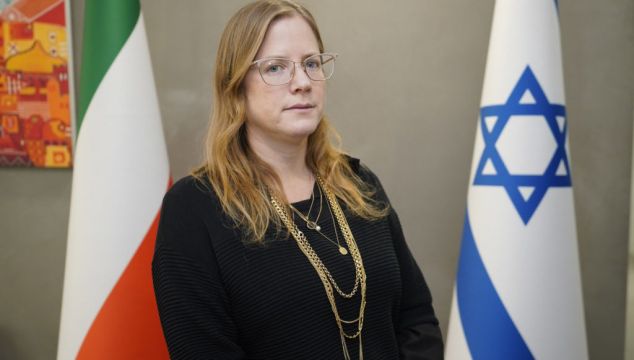The political agenda here continues to be dominated by events in Israel and Gaza.
Here, we have a look at the issues that will be the key focus of this week's Dáil proceedings.
Calls to expel Israeli ambassador
Israeli ambassador Dana Erlich has not been far from headlines here in the past month.
The ambassador has robustly defended Israel's bombardment of Gaza, in retaliation for the Hamas attack on October 7th.
Ms Erlich even accused President Michael D Higgins of spreading misinformation regarding the Israel-Hamas conflict.
Sinn Féin has followed Peope Before Profit in calling for the expulsion of Ms Erlich.
However, Taoiseach Leo Varadkar has dismissed this, claiming that Ireland would “disempower” itself from having influence on the Israel-Hamas conflict if it expelled the Israeli ambassador in Dublin.
Meanwhile, Ms Erlich has dismissed comments made last week by Israeli heritage minister Amichai Eliyahu that Palestinians should "go to Ireland or the desert".
Such comments did not represent the country’s policy, she told Newstalk’s Pat Kenny show.
“There's no point in commenting on that. That was dismissed profoundly. He's not representing the policy of the government of Israel.”
Emily Hand
Speaking in Beijing, Tánaiste Micheál Martin said the Irish Government has made "key" interlocutors aware of the likely Hamas abduction of Israeli-Irish girl Emily Hand (8).
"We've made people aware of the situation that there's a potential Irish citizen, the strong likelihood essentially that she has been abducted.
"We were made aware of the situation in respect of Emily and our ambassador in Israel has been in touch with the family and it's very sensitive and that's why we haven't commented all along because of situations like this. One has to have young Emily's best well-being uppermost in how we deal with this and how we comment on this.
"Over the last while we've spoken to all the key interlocutors in the region in terms of foreign ministers and so on. We've made them all aware of the situation in respect of Emily."
Minister looks to discourage parents from buying smartphones for children
Minister for Education Norma Foley is getting sign-off from Cabinet for moves to help limit the devices for young children.
The move is prompted by concerns about primary schoolchildren’s potential exposure to cyberbullying, violent and sexual content and other online harms via smartphones.
Research has also shown children's sleep patterns, concentration and physical activity can be seriously impacted by over exposure to smart devices.
It won't be an outright ban. Instead, if the majority of parents at individual schools vote in favour of not buying smartphones for their kids, then other parents will be asked to support it.
Labour education spokesperson Aodhán Ó Ríordáin criticised the plan, labelling it “classic Fianna Fáil PR spin".
He called it an attempt to “distract from the myriad of failings in the Department including the dearth of teachers available, particularly to cover maternity posts".
“Rather than tackling on the real issues, on the things that parents actually care about, the Minister is investing time in issuing meaningless guidelines – it is outrageous.”
Mr Ó Ríordáin pointed to an INTO survey that has found 800 vacant teaching posts across the country.
“Schools are being forced to plug staffing gaps with special needs assistants and unqualified staff. Why doesn’t the Minister focus her energy on addressing this crisis instead?”
Abroad
In the UK, British prime minister Rishi Sunak set out his stall for the next general election, expected next year, in the King's Speech.
With Labour running way ahead in the opinion polls, Mr Sunak's team is hoping that his agenda will close the gap by reducing what he says is the burden of Britain's climate change targets on households and by toughening sentences for violent offenders.
In the US, polls make for worrying reading for Democrats a year away from the presidential election as Donald Trump leads US president Joe Biden in five of six key battleground states.
Additional findings from The New York Times and Siena College Polls released on Monday, however, showed that if Mr Trump were to be convicted in criminal charges against him, some of his support in some swing states would erode by about 6 per cent - "enough, potentially, to decide the election".
Meanwhile, leading Democrats have privately expressed concerns about the age of Mr Biden (80) and his waning popularity.







